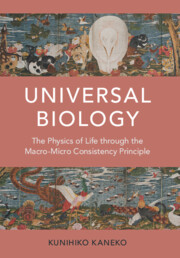Book contents
- Frontmatter
- Contents
- Preface
- 1 The Potential of Universal Biology
- 2 Methodology in Universal Biology
- 3 Reproduction of Cells: Dynamic and Thermodynamic Characteristics, Dormancy, Fluctuation, and Requisites of Protocells
- 4 Generic Adaptation of Cells
- 5 Adaptation and Cellular Homeostasis
- 6 Cellular Memory
- 7 Cell Differentiation through Development
- 8 Evolution of Phenotypic Plasticity and Robustness in Terms of Phenotypic Fluctuations
- 9 Direction and Constraint in Phenotypic Evolution
- 10 Summary and Future Issues
- References
- Index
5 - Adaptation and Cellular Homeostasis
Published online by Cambridge University Press: 11 November 2025
- Frontmatter
- Contents
- Preface
- 1 The Potential of Universal Biology
- 2 Methodology in Universal Biology
- 3 Reproduction of Cells: Dynamic and Thermodynamic Characteristics, Dormancy, Fluctuation, and Requisites of Protocells
- 4 Generic Adaptation of Cells
- 5 Adaptation and Cellular Homeostasis
- 6 Cellular Memory
- 7 Cell Differentiation through Development
- 8 Evolution of Phenotypic Plasticity and Robustness in Terms of Phenotypic Fluctuations
- 9 Direction and Constraint in Phenotypic Evolution
- 10 Summary and Future Issues
- References
- Index
Summary
The other facet of adaptation, immutability or homeostasis, is discussed. Dynamical system models that buffer external changes in a few variables to suppress changes in other variables are presented. In this case, some variable makes a transient change depending on the environmental change before returning to the original state. This transient response is shown to obey fold-change detection (or Weber–Fechner law), in which the response rate by environmental changes depends only on how many times the environmental change is to the original value. As for the multicomponent cell model, a critical state in which the abundances of each component are inversely proportional to its rank is maintained as a homeostatic state even when the environmental condition is changed. In biological circadian clocks, the period of oscillation remains almost unchanged against changes in temperature (temperature compensation) or other environmental conditions. When several reactions involved in the cyclic change use a common enzyme, enzyme-limited competition results. This competition among substrates explains the temperature compensation mentioned above. In this case, the reciprocity between the period and the plasticity of biological clocks results.
Keywords
Information
- Type
- Chapter
- Information
- Universal BiologyThe Physics of Life through the Macro-Micro Consistency Principle, pp. 130 - 156Publisher: Cambridge University PressPrint publication year: 2025
Accessibility standard: Inaccessible, or known limited accessibility
Why this information is here
This section outlines the accessibility features of this content - including support for screen readers, full keyboard navigation and high-contrast display options. This may not be relevant for you.Accessibility Information
Content Navigation
Allows you to navigate directly to chapters, sections, or non‐text items through a linked table of contents, reducing the need for extensive scrolling.
Provides an interactive index, letting you go straight to where a term or subject appears in the text without manual searching.
Reading Order & Textual Equivalents
You will encounter all content (including footnotes, captions, etc.) in a clear, sequential flow, making it easier to follow with assistive tools like screen readers.
You get concise descriptions (for images, charts, or media clips), ensuring you do not miss crucial information when visual or audio elements are not accessible.
